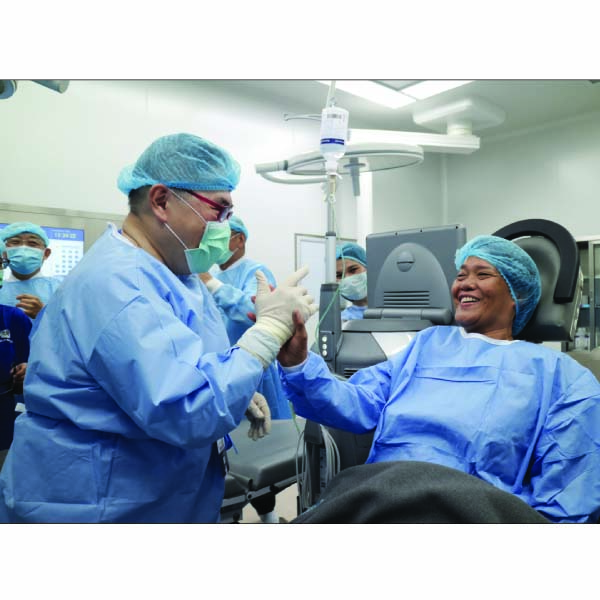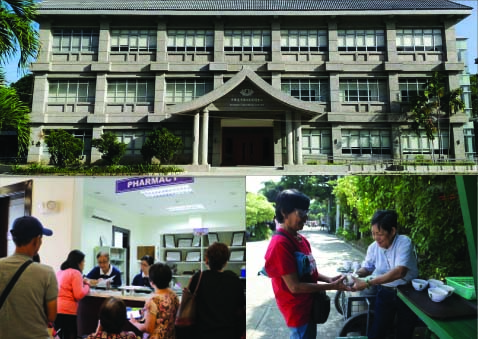
Tzu Chi Foundation is known for its disaster relief works. In the aftermath of Super Typhoon Yolanda in Leyte, the Buddhist charity group’s emergency relief efforts reached over P1 billion.
The charity foundation also actively serves poor communities in other ways. One of these is through its free clinics.
A challenging start
In April 1995, Tzu Chi volunteers held their first medical outreach in Baguio City. Doctors and nurses of Chinese General Hospital were led by the late Dr. Leh Siu Chuan, who was the hospital’s deputy director.
The medical team had only scant resources in the beginning, but it did not stop team members from doing their work. Surgeries were done in a school classroom using flashlights as improvised surgical lighting. Intravenous fluid bags were held by standing medical volunteers. Doctors carried patients in their arms to the makeshift recovery room after the surgery; there were no stretchers.
Since that challenging start, Tzu Chi’s Philippine chapter has undertaken 242 medical missions, from the northernmost province of Batanes to General Santos City in the far south. It has given thousands of patients consultation and treatment in ophthalmology, dentistry, minor and major surgery, pediatrics, general medicine and traditional Chinese medicine.
In 2007, Tzu Chi Foundation Philippines built its first charitable clinic, located on its premises in Sta. Mesa, Manila. It gives free checkups and treatment for indigent patients with dental and eye problems.
In 2016, this clinic turned into a three-storey Eye Center. It has consultation rooms, diagnostic rooms, a pharmacy and four state-of-the-art operating rooms featuring advanced optical equipment. All services are free for indigent Filipinos.
Caring doctors
The Eye Center, like Tzu Chi’s six hospitals in Taiwan, is anchored on Tzu Chi founder and Buddhist nun Dharma Master Cheng Yen’s principle of patient-centered medical care that respects all lives as equal.
The foundation uses top-of-the-line medical equipment to provide quality medical care. It also encourages more medical practitioners to serve.
At present, there are 14 eye specialists, five optometrists, a pediatric doctor, an internist and three anesthesiologists at the Eye Center. These doctors have their own private practices, but volunteer regularly at the center and for medical missions out of town. The ophthalmologists offer an array of specialties: glaucoma, anterior segment surgeries, cataracts and refractive surgeries, corneal and external diseases, oculoplastic and orbit surgery, pediatrics and vitreo-retinal surgeries.
This diverse medical team enables the center to deal with almost all kinds of eye problems. Every week, doctors at the center treat hundreds of patients, some of whom wait outside as early as 5 a.m.
Most of the patients live in Metro Manila. Others are from as far as Aparri, Leyte, Bohol and Lanao del Norte. That they traveled so far for the free checkups and surgery underlines how desperately they need help.
Patients open their hearts
Treating patients for their physical illness is part of the Tzu Chi Eye Center’s mission. The other part is to treat their spiritual illness by changing the way they think. Tzu Chi volunteers share with patients the principle of giving without expecting anything in return. The Eye Center was set up and is run with donations from kind-hearted individuals. They reiterate Master Cheng Yen’s teaching that helping someone in need is not a privilege of the rich alone. Anyone can extend a helping hand, even patients from the country’s poorest.
Many patients have accepted the philosophy and save their coins, handing over cans full of coins to be given to charity on their next visit the Eye Center for checkups. For her part, patient Jennifer Danao, 65, donates regularly to support the center’s operations. The Eye Center had treated her cousins for cataracts. In June, her husband Andres, 71, underwent laser surgery for glaucoma. All at Tzu Chi’s expense.
The can Danao brings to the center is always filled to the brim with coins saved from the whole family’s combined loose change and from selling plastic bottles, tin cans and cartons to the junkshop.
“We have seen and learned that so many people are suffering from different illnesses, so if we don’t make donations now, how can we hope to help them?” she said
Through their work, volunteers at the Tzu Chi Eye Center have healed eye problems and opened people’s hearts, creating a cycle of love that will benefit more people in the years to come.
Albay twins: double the hope
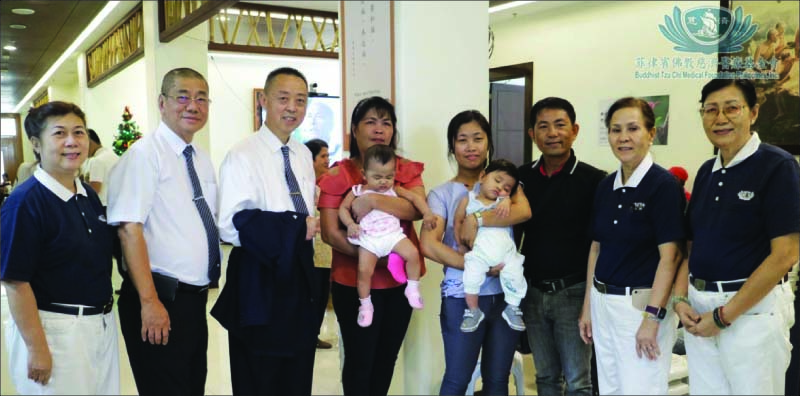
Born three months early, fraternal twins Anika and Adrieyl Panday of Albay province developed retinopathy of prematurity because of the abnormal growth of their retinal vessels.
Parents Mary Ann and David brought the twins to an ophthalmologist.
“We were told that our children will never be able to see the world. There was just nothing they could do to save the children’s eyesight,” Mary Ann recalls.
A retired specialist, Dr. Narciso Atienza, heard about the twins from his colleagues in Albay. He asked to see the twins, who, by then, were already 11 months old. After examining their condition, Atienza said there was a small chance that surgery could help.
The parents consented to surgery, but could not afford the procedure’s cost: P70,000-P90,000 for each eye.
Mary Ann is a public secondary school teacher and David, a private school registrar.
Seeing their hesitation, Atienza advised them to visit the Tzu Chi Eye Center in Sta. Mesa, Manila, where he volunteers as a surgeon.
On Nov. 8, the family took the long journey from Albay to the Tzu Chi Eye Center. After processing the twins’ papers and medical clearances, Atienza, on Nov. 30, operated on them.
The result of the surgeries will take a while to show. But knowing the twins have been given a fighting chance to live normally is enough to put Mary Ann and David’s hearts at ease.
On Dec. 1, the family took the bus back to Albay. They left behind a P2,000 cash donation to the Tzu Chi Eye Center, and a promise to visit again when the twins are bigger so they can personally thank the people who helped them. — JMD
Former squint patient seizes chance to give back
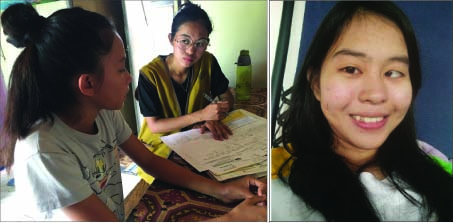
Alyssa Candela’s dream led her to major in Social Work in college because she wanted to help people who are less privileged in life.
Today, Candela, 22, is living her dream.
A social worker at Tzu Chi Foundation’s office in Ormoc City, Leyte, she handles medical cases from across the town, doing home visitations and helping patients.
Not only is she living her dream, Candela was once one of them: she was cross-eyed and suffered years of torment because of this. It was a congenital condition.
She grew up in Tacloban City, where other children called her “crossed-eyed Alyssa,” and she got into fights because of the condition. “In my heart, of course, I felt hurt.”
Love from family and friends kept her strong through those painful years. To avoid being stared at, she found ways to conceal her squint. She styled her hair so some strands fall over the right side of her face, covering her crossed eye.
In October 2018, at the Tzu Chi annual Medical Mission in Tacloban, she signed up with them as volunteer.
During the screening for eye patients, she met Tzu Chi International Medical Association eye surgeon Dr. Antonio Say.
“When he saw me, Say asked, ‘what’s behind those bangs?’” said Candela.
The eye surgeon tucked the bangs away from her face, exposing her squint. The next thing he said took her by surprise.
“He asked me if I wanted an operation.” Although she doubted if it was possible, Candela said, “Yes.”
Another TIMA volunteer, Dr. Catherine Macaraig, a strabismus and pediatrics ophthalmologist, operated on her eye at Tacloban’s Divine World Hospital.
“I consider that incident as my life’s major plot twist,” she said. “I was very happy because (I intended) to volunteer and help out but it turned out I was the one they helped.”
This is Candela’s story, one she tells people she meets, a story that inspires her work.
“I am just really happy to be doing things for Tzu Chi Foundation. This is really my way of giving back. This is my chance to help those in need,” she said. — JMD
Tumor begone

Maria Lyne Gregorio, 39, and her son Santino, 10, were a picture of misery when they first visited the Tzu Chi Eye Center in April.
Her eyes were red from crying and worry for Santino, her eldest.
The boy has optic glioma, a non-cancerous brain tumor of the optic nerve which controls vision. The condition began to show when he was 4. Eventually, he lost his sight in his right eye.
Despite this impediment, Santino tries to live like a normal kid in Agdangan, Quezon province. He plays basketball, goes to school and is currently in fifth grade.
But other kids tease him because of his condition. Santino does not tell his parents, so they won’t worry.
“I found out from his friends that he gets bullied. He comes home very quiet sometimes. Whenever I ask him what the problem is, he would just answer ‘It’s nothing. I’m just tired, or I’m just hungry,’” Maria Lyne shared.
In April, Maria Lyne, her husband and Santino went to Manila and seek help from a televised public service program. They were referred to Tzu Chi Foundation.
Upon seeing his condition, the doctors at Tzu Chi Eye Center scheduled Santino for surgery. On July 1, a medical team from the ophthalmology and neurosurgery departments of Cardinal Santos Medical Center went to work. The surgery took four hours. The medical team removed the tumor on the optic nerve instead of taking out the eyeball.
Although Santino’s right eye can never see again, doctors recognized the importance of keeping his eye to give him a semblance of living normally.
On July 4, Tzu Chi volunteers paid Santino a visit at the hospital. They also brought treats for him. Santino was still recovering from the surgery and happy that the tumor is gone.
His father, Leo, 39, a tricycle driver, is grateful. He did not know what to do or where to begin looking for treatment when he first learned of Santino’s condition.
“We’re very happy now that he has been operated on. We only have to wait for his wounds to heal, but the worst has passed. His condition has been treated,” he said.
For her part, Maria Lyne is likewise grateful to Tzu Chi. Without its help, “perhaps my son would have lived with insecurity for being different from other kids,” she says.
On July 19, mother and son returned to the Eye Center for a checkup. The wounds from the surgery were still healing but Santino’s confidence is returning. He holds his head high and looks people in the eye.
Before surgery, he walked with his head bowed, his mother says. “Whenever people look at him, he (looked) the other way to avoid their gaze. But now, he has regained his confidence, his self-esteem has improved a lot.”
Santino also expressed his gratitude.
“Before I was always nervous and afraid of going out because other kids might bully me. Thank you because I got (the operation) through your help,” he said.
With the tumor gone, a burden has been lifted off the family. During their recent visit at the Tzu Chi Eye Center, there were big, bright smiles from Santino and his mother – a far cry from their looks of misery when Tzu Chi volunteers first met them three months ago.
The worst has passed for Santino. But he still needs 10 cycles of chemotherapy to prevent the optic glioma from growing back.
Tzu Chi will continue to help him until his full recovery.
Homeless man gets his dignity back
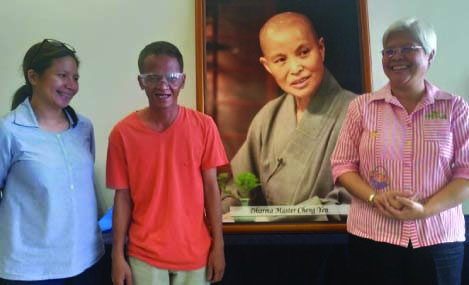
His eyesight was so bad Emmanuel Hilario, 43, depended on his eyeglasses to see. But when those broke, he was as good as blind.
In 2018, Hilario had his eyes checked when a group of doctors held a medical outreach program in Masbate. He hoped to get free eyeglasses. Instead, he learned he had cataracts, and eyeglasses would not help.
Hilario went to Manila to ask for his stepsister’s help, only to find she had moved from the last address she gave him.
With no way of getting home, he was reduced to living in the streets, begging for alms and food.
“As much as I wanted to work, nobody was willing to hire me because of my condition,” he shared. “It was hard and embarrassing to become a beggar, but I had no other choice.”
Around his usual spot, he met a little girl named Trisha. She often gave him clothes, food and even helped him look for a place to spend the night.
One day, Trisha suggested that he seeks help from a public service program on television. Hilario went and was referred to the Tzu Chi Foundation.
At Tzu Chi’s Eye Center in Sta. Mesa, Manila, Tzu Chi International Medical Association medical director and ophthalmologist Dr. Bernardita Navarro offered to remove his cataracts for free.
When the volunteers learned that he was homeless, they arranged for him to stay at a transient house while in Manila.
On March 6, the cataract was removed from his right eye. Two days later, the medical team did the same on his other eye. Tzu Chi Medical Foundation took care of the expenses for both surgeries.
When Hilario was healthy enough to travel, the foundation paid for his bus fare back to Masbate and gave him P3,000 cash to help him start life anew.
With his vision restored, Hilario has also regained back his dignity. Today, he no longer begs for alms but supports himself. He sells tupig (ground glutinous rice and coconuts strips wrapped in banana leaves), and other snacks around his neighborhood.
With his life and eyesight restored, Hilario now hopes to find his stepsister, the only family he has left. — JMD
